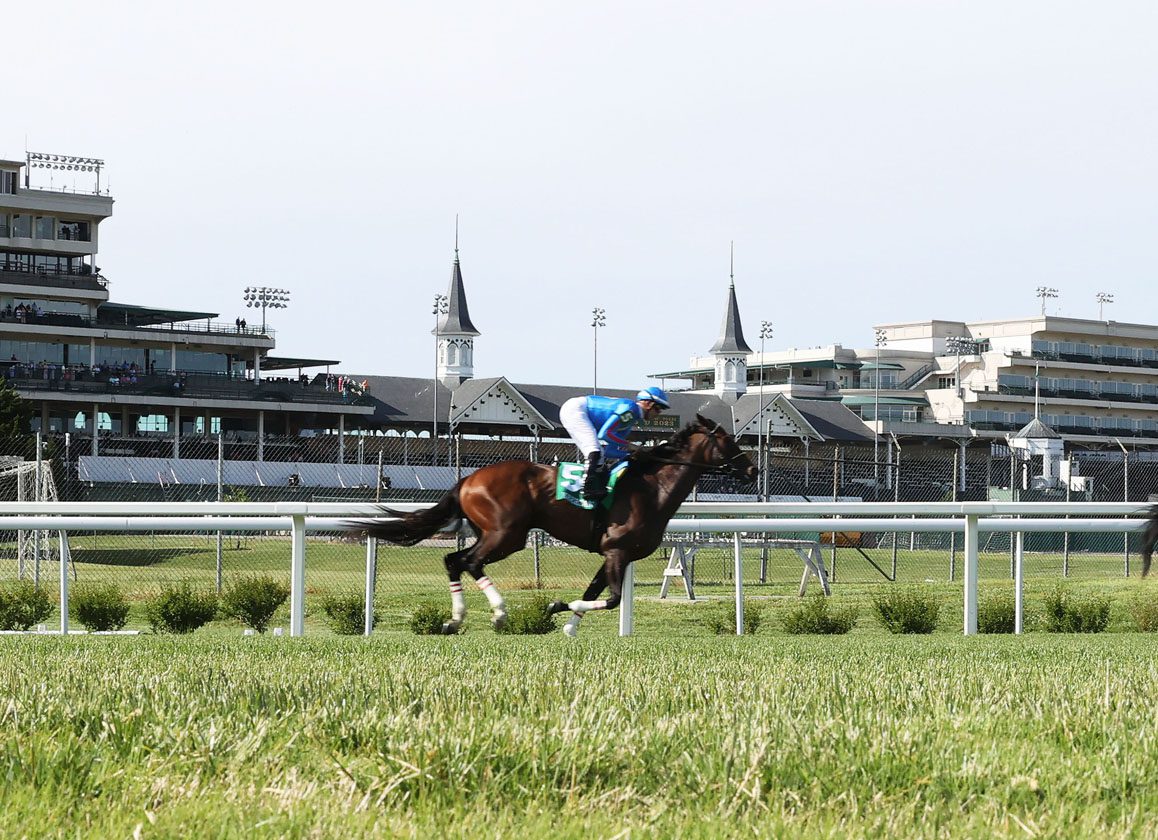By Bill Finley
In the wake of 12 horses suffering fatal injuries since Apr. 27 and after a Thursday meeting with horsemen, Churchill Downs announced new safety initiatives that will go into effect immediately.
They are:
- A pause of track-based incentives such as trainer start bonuses and purse pay-out allocations to every race finisher through last place. Purse pay-outs will now be limited to the top five finishers. Churchill Downs officials will engage in ongoing discussions with horsemen to determine ways to reallocate these funds to best serve industry needs. With record-high purses, Churchill has been able to allocate purse money to all starters. For example, the 12th-place finisher in last Saturday's $225,000 Keertana S., Sinfiltre (Uncle Mo) earned $2,070 despite losing by 22 1/4 lengths.
- Restricting the number of starts per horse to four starts during a rolling eight-week period.
- Ineligibility standards for poor performance. Horses that are beaten by more than 12 lengths in five consecutive starts will be ineligible to race at Churchill Downs until approved by the Equine Medical Director to return.
Of the 12 horses who have died thus far at the meet, the new rules would have been applicable to only one, Kimberley Dream (Colonel John). The 5-year-old mare was beaten by 12 lengths or more in five straight races before breaking down in a race on May 27, the most recent fatality to occur at the track. During that stretch, she was beaten an average of 26 lengths per race.
The Thursday morning meeting also included a presentation by California-based equine surgeon Dr. Ryan Carpenter. He provided educational information and tools to trainers and practicing veterinarians about advanced interventions that can be considered for certain equine injuries.
“The attending veterinarians and trainers at Churchill Downs are incredibly capable and knowledgeable,” said Dr. Will Farmer, Equine Medical Director for Churchill Downs Incorporated, in a statement released by the track. “We feel a duty to provide the latest information on surgical interventions from an expert who experienced the challenges in California a few years ago that we currently face today. Any decision must be made first and foremost with the long-term well-being of the horse in mind. It is imperative that all available, educated and informed options can be efficiently, confidently and thoroughly relayed to the owners.”
Trainer Dale Romans was among those who attended the meeting, which was held at the backstretch recreation center. The Romans-trained Rio Moon (Bal a Bali {Brz}) is among the horses who have died, suffering a fatal injury in a May 14 race.
“It was packed. Standing room only,” he said. “It was the first horsemen's meeting I've ever been to that had that kind of turnout. Everyone is concerned.”
While Romans said he wasn't sure what kind of impact the new rules will have, he said he is confident that track management will do everything in its power to get the situation under control.
“People should just be glad that Churchill is on top of it,” he said. “They will do everything they can to keep every horse healthy and safe. This could help. I'm sure Churchill is studying this to try to find the common denominator. They must have found something where they think these rules will help. I trust in Churchill. This is a safe racetrack. It has always has been one of the safest tracks in the world. At Churchill, horses come first and horse racing comes second. The trainers here may be Churchill loyalists, but that's ok because they've earned our loyalty.”
Romans said a slew of breakdowns in a short period of time is always a possibility.
“In my opinion, this is a statistical anomaly,” he said. “We have a rash of breakdowns right now and then we might go for a very long time without one.”
Trainer Kenny McPeek did not attend the meeting, but touched based afterward with his assistant, who did. Like Romans, he wasn't ready to point any fingers.
“The unfortunate part of our sport is that horses do get injured,” he said. “Their efforts are genuine and they are trying to find some solutions. But I don't think it's ever going to be a zero game. Every time I breeze a horse or run a horse, I want them to come back good. You're always keeping your fingers crossed that nothing goes wrong. But it does sometimes. I don't want to jinx myself but my horses have done great over this track this spring. We've had a large group of horses at Churchill and we haven't had any issues. I think the track has been fantastic all spring.”
One issue not addressed by Churchill was the ratio between claiming prices and purses. Some in the industry believe that horsemen have an incentive to run unsound horses in claiming races when the purses are lucrative. At Churchill, $20,000 claimers run for a purse of $52,000 or 2.6 times the claiming price. The Horse Racing Integrity and Safety Authority (HISA) had proposed a rule that the purse of a race could not be more than 1.6 times the claiming price. But that rule was rescinded in 2021 after HISA received negative feedback.
Not a subscriber? Click here to sign up for the daily PDF or alerts.






